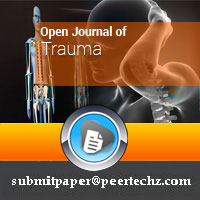Open Journal of Trauma
Trauma-related aggression - Dissociation or psychosis
John E Berg*
Cite this as
Berg JE (2019) Trauma-related aggression - Dissociation or psychosis. Open J Trauma 3(1): 001-002. DOI: 10.17352/ojt.000017Psychosis, dissociation or simple aggression may have similar clinical presentations. A case in a resident facility for trauma treatment is presented and discussed. Getting triggered by someone often happens in patients with dissociative disorders after childhood traumatization, rarely so in psychosis. Aggressive acts may also be seen without apparent connection to trauma.
Introduction
Severe trauma has lasting impact on people. The end result is great suffering, except in those described by Antonovsky surviving KZ-camps with a close to normal sense of coherence [1]. Among the great sufferers posttraumatic stress (PTSD) may develop and in some also a dissociative disorder. Dissociation is a disputed term, psychosis less so. Parts of the symptomatology related to both are the same, derealization and dysmorphofobia and also level of conscience. Whereas dissociation develops in childhood, psychosis rarely does [2]. In this student sample the authors maintained that dissociation mediated the relationship between early maltreatment and both hallucination proneness and delusional ideation. For some people, traumatic memories may intrude into conscious awareness in adulthood as psychotic-type experience. Whether the traumatic memories appear as psychotic or dissociative episodes rather than purposeful aggressive acts under the disguise of the two former is illustrated with the following case.
Case
The setting is a specialized resident institution for people in need of treatment for trauma experiences in childhood or adolescence within the realm of posttraumatic stress disorder. They are all above 18 years of age. Referrals are from psychiatric outpatient clinics, i.e. a tertiary treatment facility. One female resident patient, aged 38 years, attacked a psychiatrist, whom she had no relation to, in the canteen. The psychiatrist was standing in front of the coffee machine preoccupied with choosing a cup of coffee. She ran up to him shouting that “you trigger me (remind me of a person who had traumatized me)” and poured a bottle of milk over the psychiatrist. He withdrew from the coffee machine area. She was taken care of by wardens. She somewhat later asked if she had used a knife. The impression of the baffled psychiatrist was that she was conscious and acted on purpose to harm. The object of the aggressive act, the person she attacked, was unknown to her and not in a therapeutic relation. However, she had a history of what resembles intermittent explosive disorder. She had previously not been diagnosed as psychotic, and not deemed so after the attack. No antipsychotic medication was previously given and not needed after the attack. She did not express remorse. The act described may be viewed as an expression of dissociation, an acute psychotic outburst or as an act of aggression not related to neither. The ward atmosphere was tolerant to the expression of dissociation by supplying safe places and open discussions of the topic. Indicating, “I am triggered” would be understood as part of the dissociative disorder of the patient.
Discussion
Exposure to intolerable violence in the form of physical, mental or sexual behaviour from family members is a known cause of posttraumatic stress reactions (PTSD). Dissociation may be a way of creating a room for escape when exposed to new violence or reminded of the circumstances. The case described may be an example of such dissociative behaviour, but most probably not of any acute psychotic reaction. The ward has an accepting attitude towards dissociation and focuses on training the patients in understanding and curbing dissociative reactions. The patient may thus have used this atmosphere for an aggressive act not related to her experiences with perpetrators in earlier life. It is difficult to counter an utterance of “I get triggered by....”.
Hardy et al studied the psychological mechanisms mediating effects between trauma and psychotic symptoms. They have discussed the role of affect regulation, intrusive trauma memory, beliefs, and depression [3]. In a sample of 228 patients with relapsing psychosis a fifth met the criteria for PTSD. But no relationships were identified between childhood physical abuse and psychosis.
Choi et al. studied the relation between childhood abuse and later psychotic symptoms [4]. 126 patients diagnosed with major psychiatric conditions with comorbid symptoms of psychosis participated. They found, not surprisingly, that childhood physical, emotional, sexual abuse developed into PTSD. Furthermore, in this cohort of patients with major psychiatric conditions they also found psychotic symptoms, but no reference was made to the co-occurrence of dissociation.
The differential diagnosis between psychosis and dissociation is cumbersome. Outbursts would be of a longer duration in psychosis and in need of antipsychotic medication especially after an act. Dissociative outbursts are mostly of shorter duration and the treatment would be trauma- related psychotherapy, and psychotropics would be of little help, whereas aggressive acts should be handled as elsewhere in society. This case is a reminder of the different origins of triggers in the treatment of trauma.
- Antonovsky A (1993) The structure and properties of the sense of coherence scale. Soc Sci Med 36: 725-733. Link: https://tinyurl.com/yxbmcqdt
- Cole S, Newman-Taylor K, Kennedy F (2016) Dissociation mediates the relationship between childhood maltreatment and subclinical psychosis. J Trauma Dissociation 17: 577-592. Link: https://tinyurl.com/y3nt85pk
- Hardy A, Emsley R, Freeman D, Bebbington P, Garety P, et al. (2016) Psychological mechanisms mediating effects between trauma and psychotic symptoms: The role of affect regulation, intrusive trauma memory, beliefs, and depression. Schizophrenia Bulletin 42: S34-S43. Link: https://tinyurl.com/y4uyygxt
- Choi J, Choi Y, Kim B, Lee D, Gim M, et al. (2015) The effects of childhood abuse on self-reported psychotic symptoms in severe mental illness: Mediating effects of psottraumatic stress symptoms. Psychiatry Res 228: 389-393. Link: https://tinyurl.com/y3oj7qld
Article Alerts
Subscribe to our articles alerts and stay tuned.
 This work is licensed under a Creative Commons Attribution 4.0 International License.
This work is licensed under a Creative Commons Attribution 4.0 International License.

 Save to Mendeley
Save to Mendeley
